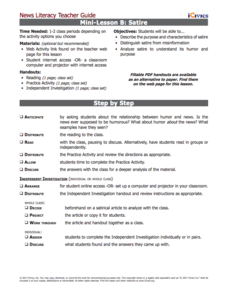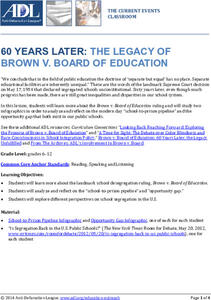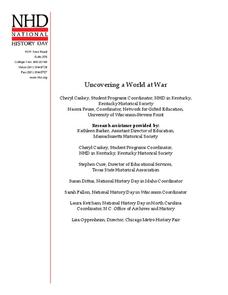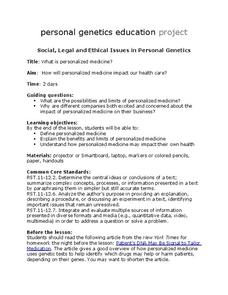EngageNY
Analyzing the Author’s Perspective: “The Shakespeare Shakedown”
Simon Schama's article "The Shakespeare Shakedown" allows young writers to see how authors respond to conflicting viewpoints. Class members participate in discussion appointments with five peers to explore the author's point of view.
Curated OER
A Pill with a View
Learners brainstorm a list of potential uses for micro-video technologies. After reading an article, they analyze the development of a new pill-sized camera. In groups, they create a children's book that shows them the various systems of...
iCivics
Mini-Lesson B: Satire
Hey, what's so funny? Explore the use of satire in a variety of media with a hands-on lesson. Fourth in a five-part journalism series from iCivics, the activity introduces satirical language in print and online. Pupils work alone or in...
National Endowment for the Humanities
Lesson 4 James Madison: Internal Improvements Balancing Act—Federal/State and Executive/Legislative
Who has the power? The founding fathers asked the same question when the United States was formed. Learners explore issues that arose during Madison’s presidency that raised constitutional questions. Through discovery, discussion, and...
Nemours KidsHealth
Media Literacy and Health: Grades 9-12
An essential skill for 21st-century learners is to know how to find reliable sources of information. Two activities help high schoolers learn how to determine the reliability of health-related news from websites, TV, magazines, or...
Western Justice Center
Communication Skills
Good communication skills are key to resolving conflicts. A short video introduces learners to the concept of active listening and provides tips that will help them resolve conflicts. Class members then read articles, analyze scenarios,...
Nemours KidsHealth
Obesity: Grades 6-8
Screen time and fast foods, sugary drinks and greasy fries have lead to one-third of tween and teens being overweight or obese. As part of the Health Problems Series scholars analyze the nutritional value of the school food services menu...
Anti-Defamation League
60 Years Later: The Legacy of Brown v. Board of Education
Although the 1954 U.S. Supreme Court decision Brown v. Board of Education declared segregated schools unconstitutional, huge inequalities still exist in U.S. public schools. Learners analyze and discuss data presented in two...
Newseum
Propaganda Through History: Analyzing Historical Sources
Working in teams, pairs, or individually, scholars select one resource from a gallery of historical sources and consider which examples might be considered propaganda, the techniques used to persuade audiences, and evaluate how the...
Newseum
Bias Through History: Analyzing Historical Sources
Young journalists use the E.S.C.A.P.E. (evidence, source, context, audience, purpose, and execution) strategy to evaluate historical and contemporary examples of bias in the news. The class then uses the provided discussion questions to...
West Virginia Department of Education
Intelligence of Authentic Character - News Coverage and John Brown's Raid
The resource, a standalone, shows how news coverage of John Brown's Raid began when the event happened and how that reporting shaped perception in West Virginia history. The resource includes interesting anticipatory discussion...
National History Day
Uncovering a World at War
Has media always had an influence on public policy? After researching and reading news articles written during World War I, learners understand the influence of communication and media. They discuss articles in small groups and as a...
National Endowment for the Humanities
Chronicling America: Uncovering a World at War
As part of a study of World War I, class members read newspaper articles from the time that urge American involvement, non-involvement, or neutrality. Using the provided worksheet, groups analyze the articles noting the central argument...
Historical Thinking Matters
Spanish-American War: 1 Day Lesson
After analyzing newspaper articles portraying different perspectives of the explosion of the Battleship USS Maine, your young historians will take a stand on which position is the most believable in both discussion and writing.
University of Arkansas
Assessment and Discussion
"Without concerned citizen action to uphold them (human rights) close to home; we shall look in vain for progress in the larger world. . ." Eleanor Roosevelt's comment is used to set the stage for the conclusion of a five-lesson unit...
Curated OER
The Chesapeake Bay in Captain John Smith's Time
When Captain John Smith visited the Chesapeake Bay in the summer of 1608, what types of animals and habitats did he encounter? Your young historians will analyze primary source documents to answer this question, as well as compare the...
Facing History and Ourselves
Hands Up, Don't Shoot!
Why is it so difficult to develop a clear understanding of the events surrounding the shooting of Michael Brown by a Ferguson, Missouri, police officer? To answer this question class members listen to a NPR discussion of the findings of...
Alabama Department of Archives and History
"Scottsboro Boys": A Trial Which Defined an Age
Here's a must-have resource. Whether your focus is racism, the Great Depression, the "Scottsboro Boys" trial, or part of a reading of To Kill A Mockingbird, the information contained in the seven-page packet will save hours of research...
Personal Genetics Education Project
Personalized Medicine
Genetics learners read an article and watch a video about personalized medicine and the hope it holds for treating patients more specifically than doctors currently are able to. They research, design, and produce a brochure about the...
Facing History and Ourselves
The Power of Images
One picture but a thousand stories. As a part of a case study of how the death of Michael Brown was reported by professional news sources and on social media class members examine the reactions of various groups to a photograph taken by...
Curated OER
All the News That's Fit to Click: Analyzing New York Times Design
Explore the New York Times, online and in print. Partners take the roles of reader and monitor while each peruses the newspaper. Discussion questions compare the online version to a hard copy print edition. Links provide comparison of...
Newseum
E.S.C.A.P.E. Junk News
Fair, balanced, and reputable information? There's an acronym for that! Scholars learn the E.S.C.A.P.E. method for evaluating news sources. Then, pupils work in small groups to read and analyze a news story and discuss the activity to...
Curated OER
The Noughties
Take a look back at a decade your class will actually remember: the noughties. Guide discussion about events your class recalls from those years, and then have them analyze an article (included). Although not specified, learners need to...
Curated OER
Get a Leg Up
Traveling through space is an amazing experience, but it definitely takes a toll on the body. After reading an article and watching a brief video, learners perform an experiment that simulates the effects of zero gravity on the human body.

























